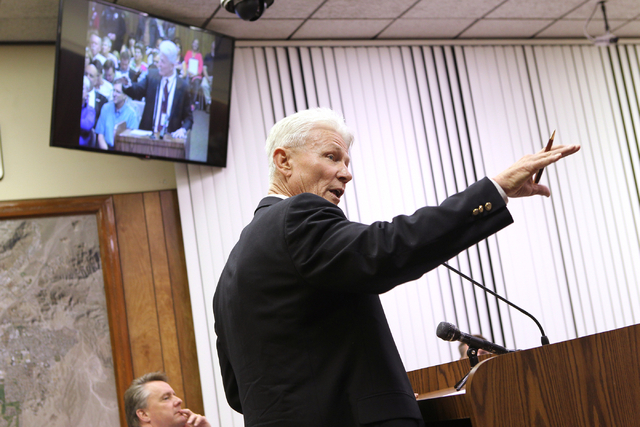Conger’s expertise betters PD
It’s been more than a year since Police Chief Bill Conger was tabbed to permanently lead Boulder City’s Police Department. Since then, he’s strived for more community policing, and improved the camaraderie between the men and women who protect the city.
Conger, who spent nearly 30 years with Metropolitan Police Department in Las Vegas, knew he needed to build a trust within the department as an outsider.
“One of the first things you need to do is work on communication and build the trust. I’ve been working on that since I’ve got here. Trust is a very important thing,” he said.
Conger took over for former Police Chief Thomas Finn, who was fired in April 2013. Sgt. Aaron Johnson, an eight-year veteran of the Boulder City Police Department, said Conger and Finn operate differently and took on whatever vision the city had in mind.
“The city has taken on a new vision, and the chief of police follows the lead of the city,” Johnson said. “You’re going to see that in any municipality or any department.”
Johnson said he never had a problem with Finn, but credited Conger with improving communication throughout the department.
“Sections of the department that never communicated before are communicating now,” he said. “You do see officers staying a little bit later to talk to one another, where before it was just … you came and you went. There wasn’t a lot of communication.”
City Manager Dave Fraser, who hired Conger, said the amount of experience he had made him an ideal candidate for the job.
“Because he’s been there, done that, it makes it so he doesn’t have a lot to prove. He’s not trying to position himself for his next job. He’s just taking care of business, and I think that’s worked very well,” Fraser said.
But Conger’s employment arrangement is a bit unique, and it has saved the city $38,863 a year. The arrangement is necessary because Conger, who retired as Metropolitan Police Department’s deputy chief in 2005, is drawing retirement benefits from the Public Employees’ Retirement System of Nevada, Fraser said.
If Conger was hired by the city full time, he would no longer be able to draw his retirement benefits, and the pay from the city would be less than his retirement pay.
The city pays Conger’s employer, Strategic Contracting Solutions, an annual fee of $114,600, the entry-level compensation for the police chief in Boulder City, plus an additional 20 percent in taxes and fees.
It is an unusual arrangement, but not unprecedented in Nevada, Fraser said. PERS was contacted and cleared the arrangement, he said.
Conger was born and raised in Las Vegas, but acclimated to small-town life when he got the job in Boulder City. He’s been a constant proponent of community policing, and it remains one of his top priorities for the department.
“Boulder City is a very neat little community. There’s a lot of close relationships here, and people are very involved with the community,” he said. “And those are the kinds of things that make my job easier.”
As Conger advocates for more foot and bike patrol and communication within the department as well as within the community, Johnson said the number of calls the department receives has surprisingly increased.
“The more involvement you get doesn’t decrease things, it actually increases them because identity goes up,” he said. “So, the more callers you have coming in, the more calls for service. (More cops) doesn’t mean crime has changed at all. It just means we’re more proactive and being able to get to things quicker and we’ll be able to solve things more rapidly.”
Conger also has made training less stressful for his officers, who are required to complete 24 hours of training by the end of the year. Conger said when he first came to Boulder City, several officers were scrambling to complete their targeted hours as the year came to a close.
He doesn’t want that problem anymore.
And after a suggestion from one of his officers, Conger helped create a “fifth shift,” which allows policemen to train in shifts every Wednesday in order to avoid last-second procrastination.
Johnson said the training has allowed them to knock out their hours earlier than expected, which in turn has helped them to gain even more training.
Another initiative Conger has pushed for is a Citizen’s Academy, which the department is hoping to begin by the start of 2015. The program allows members of the community to gain a better understanding of how police do their jobs, and during recent times where police controversies headlined the news, Johnson said it’s important for the public to understand why police do what they do.
“We’re not driving down the street with lights and sirens on to annoy you. We’re driving down the street because we’re trying to get somewhere expeditiously,” he said. “We have at times a very ugly profession, but we do it with the interest of community safety.”
Recently, the department was awarded a $10,000 grant by the Nevada Public Safety Department for being one of the state’s Joining Forces Agencies of the Year.
Joining Forces is an enforcement and education campaign that provides money for traffic safety issues that are primary causes of crash-related fatalities and serious injuries.
Conger realizes that a healthy relationship between the police department and the people of Boulder City will help make it a safer place to live. Although things have improved since he took over, Conger understands that there is always room for improvement.
“We still need to get better at getting in touch with the community,” he said. “Policemen have a two-fold thing. We need to be in touch with the community, but we also need to enforce the law. We’re going to do what we have to do to keep everyone safe.”
Contact reporter Steven Slivka at sslivka@bouldercityreview.com or at 702-586-9401. Follow @StevenSlivka on Twitter.















